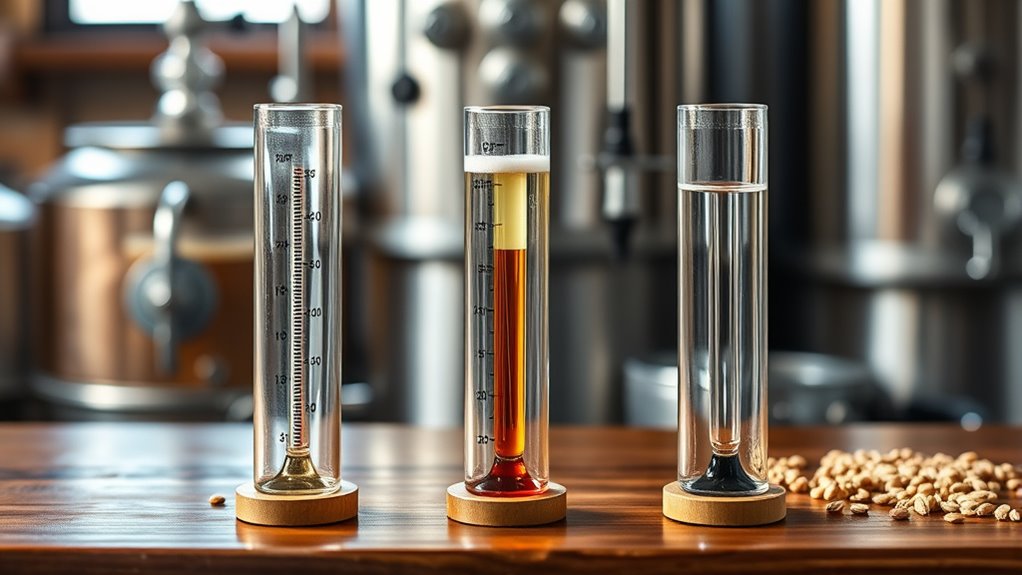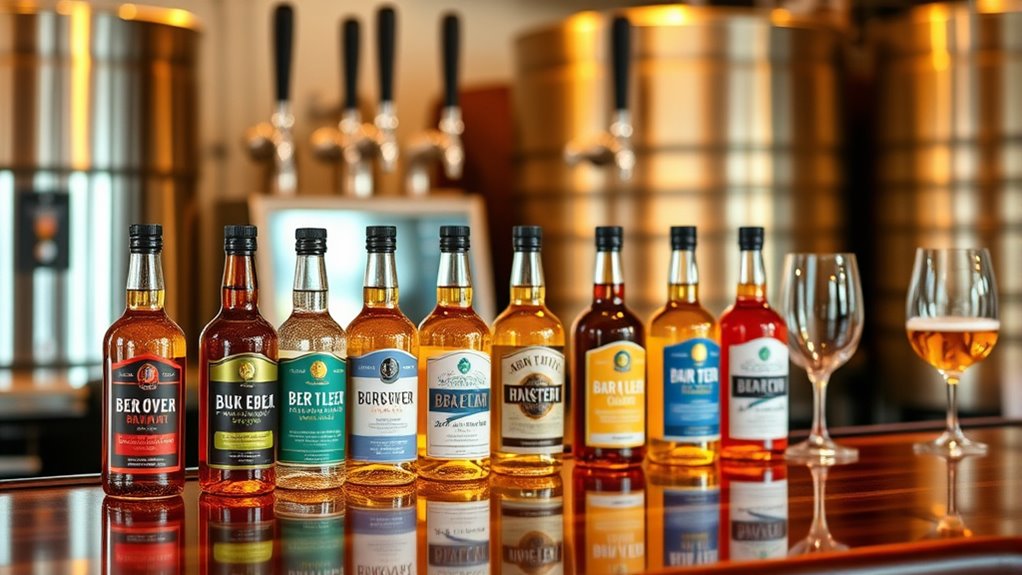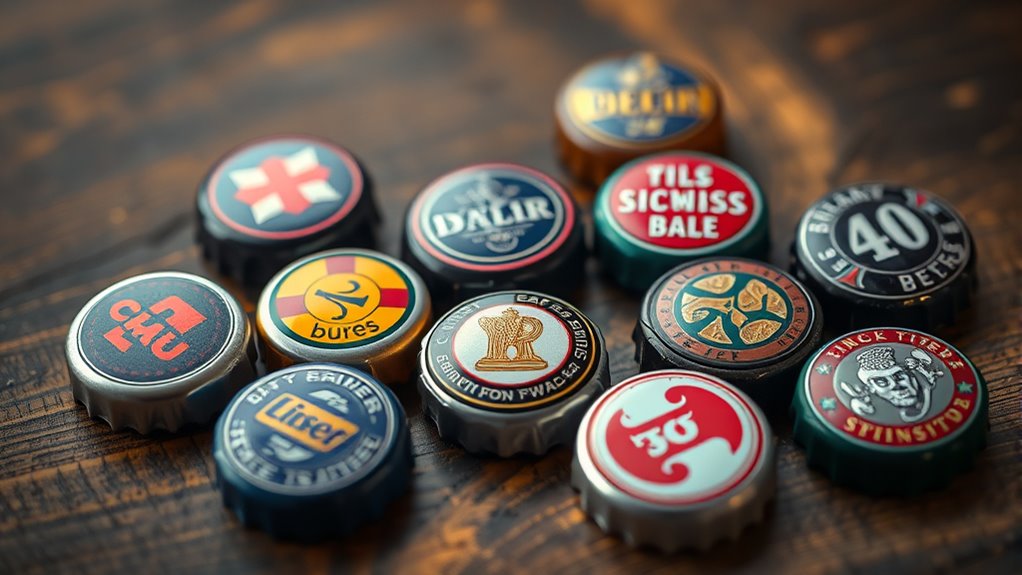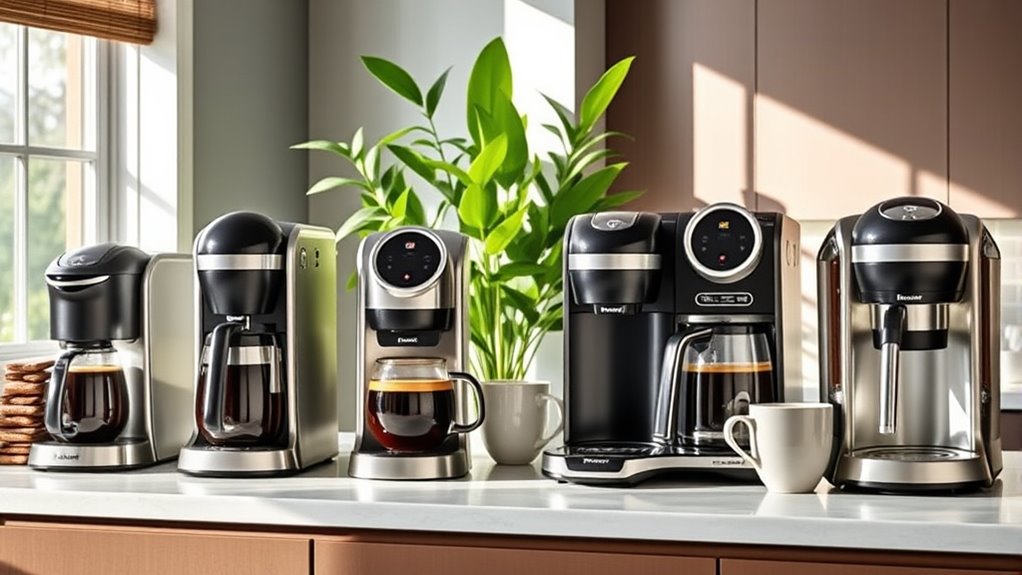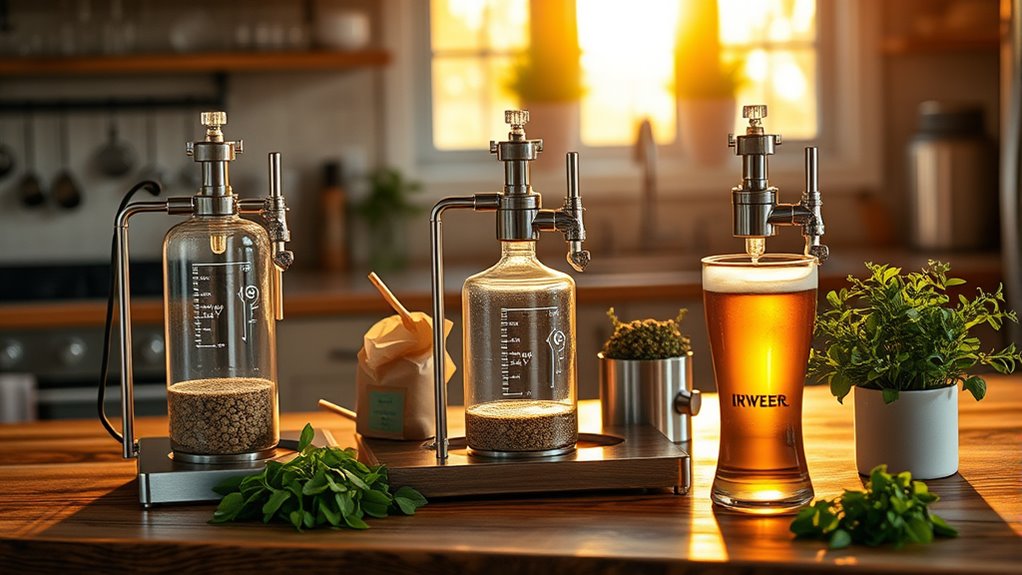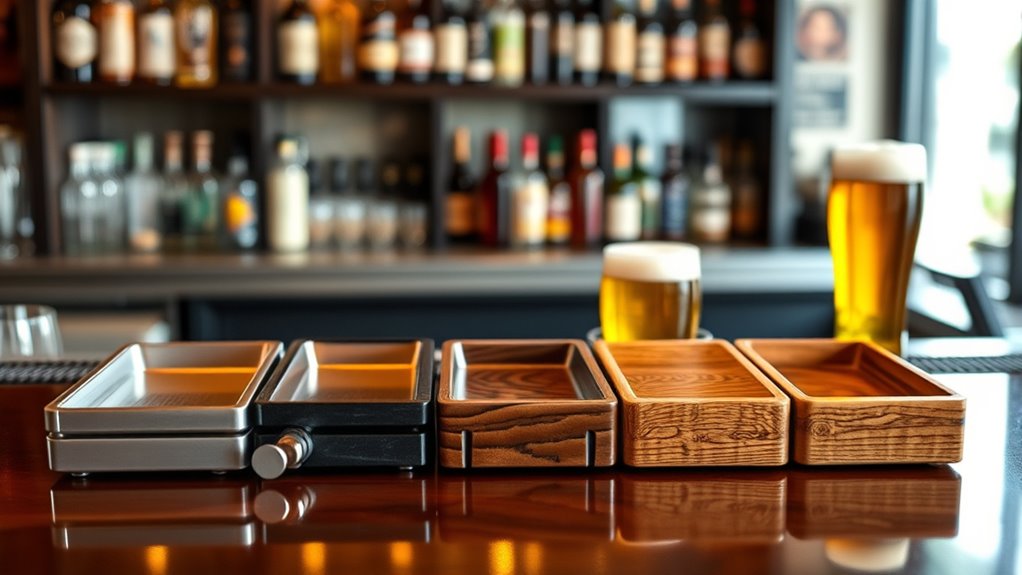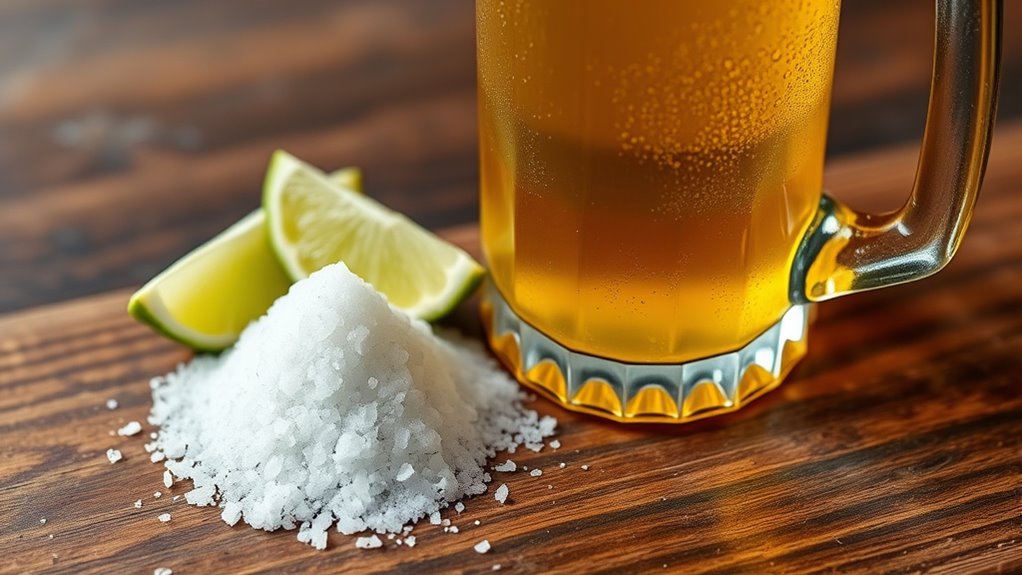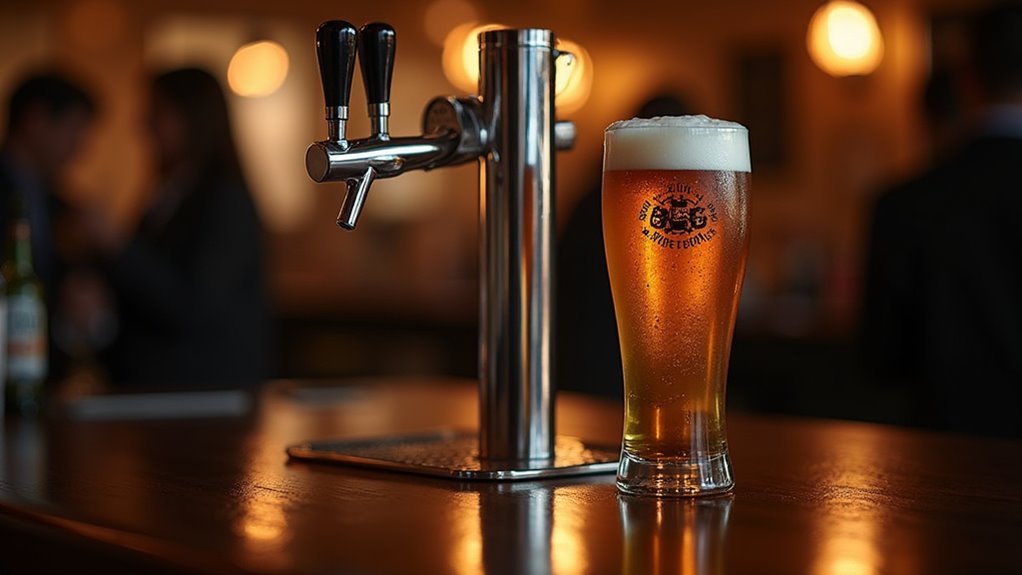For accurate home brewing, consider these three top hydrometers: the Brewing America Specific Gravity Hydrometer, known for its precise measurements across fermentation levels; the Brewers Elite Hydrometer, which features an easy-to-read color scale and is perfect for beginners; and the Circrane Hydrometer with a glass test jar set that minimizes errors. Each tool provides essential features for consistent brewing success. Keep exploring to discover more important details that can enhance your brewing experience.
At a Glance
- The Brewing America Specific Gravity Hydrometer offers precise measurements with a clear, triple scale for accurate fermentation tracking.
- Brewers Elite Hydrometer features an easy-to-read color scale, perfect for novice brewers seeking simple and reliable readings.
- Circrane Hydrometer & Glass Test Jar Set minimizes measurement errors, using only 125ml of liquid for efficient testing without waste.
- Opt for hydrometers made from lead-free and mercury-free materials to ensure safety and reliability during brewing.
- Look for models with protective cases and cleaning accessories to enhance care and prolong the lifespan of your equipment.
Brewing America Specific Gravity Hydrometer Alcohol ABV Tester
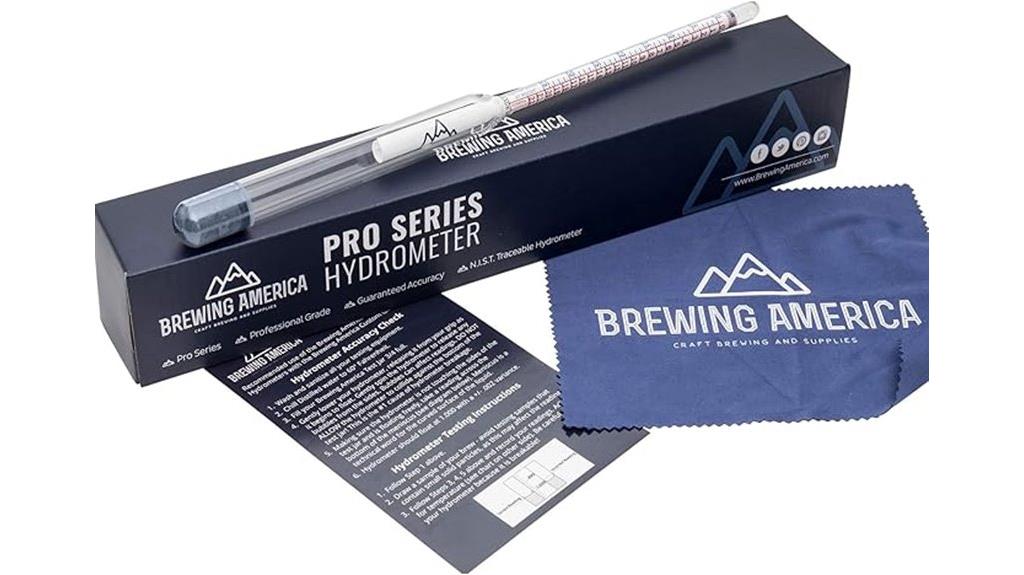
If you’re serious about home brewing, the Brewing America Specific Gravity Hydrometer Alcohol ABV Tester is a must-have tool. This American-made device, crafted by skilled glassblowers, accurately measures fermentation levels in beer, wine, cider, and mead. It features a triple scale for specific gravity, Brix/Balling, and potential alcohol, allowing you to track your brew’s progress. Weighing just 2.46 ounces, it’s designed for easy handling. With no distracting color bands, you’ll appreciate the clear readings. Though careful handling is necessary due to its delicate nature, this hydrometer’s durability and precision make it a valuable addition to any home brewer’s toolkit.
Best For: Home brewers looking for an accurate and reliable tool to measure fermentation levels in their beverages.
Pros:
- High-quality American-made construction ensures durability and accuracy.
- Clear readings without unnecessary color bands make it easy to use.
- Lightweight design allows for easy handling and portability.
Cons:
- Requires careful handling due to its delicate glass construction.
- Small markings may be difficult for some users to read.
- Packaging issues reported, necessitating handling with care during transport.
Brewers Elite Hydrometer for Home Brew Beer and Wine
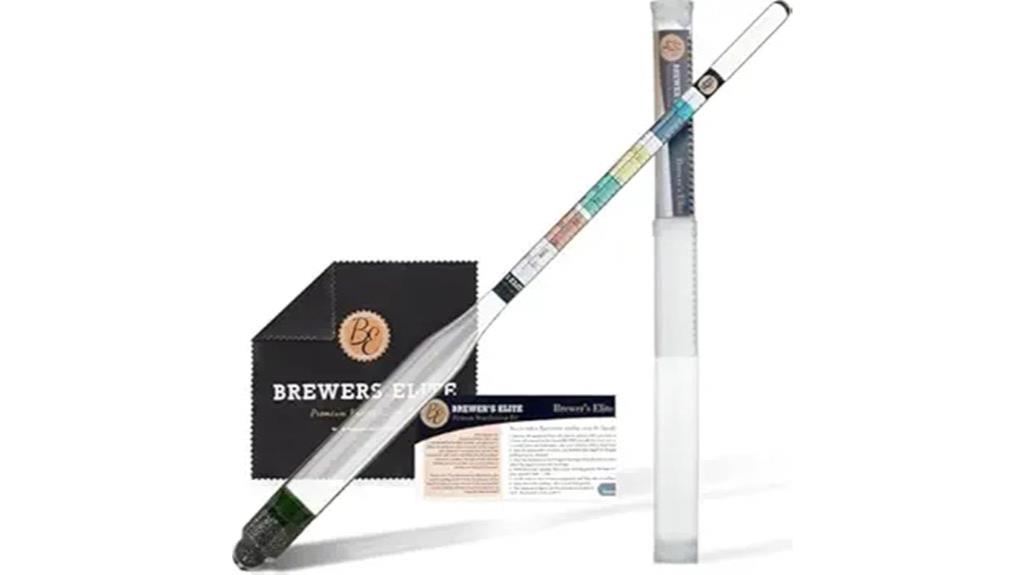
The Brewers Elite Hydrometer for home brew beer and wine is an excellent choice for novice brewers looking to explore fermentation. It features a deluxe triple scale, measuring specific gravity, potential alcohol, and brix, making it versatile for beer, wine, mead, and kombucha. With an easy-to-read color scale, you’ll find readings hassle-free. The hydrometer comes with a protective case and a microfiber cleaning cloth. Lab-tested for precision, users appreciate its accuracy and the complimentary three-month access to Craft Beer & Brewing Magazine. For best results, consider a separate test cylinder to simplify your brewing process.
Best For: Novice brewers looking to explore fermentation with accurate readings for multiple beverages like beer, wine, mead, and kombucha.
Pros:
- Deluxe triple scale measures specific gravity, potential alcohol, and brix for versatility.
- Lab-tested for accuracy, providing reliable estimates of alcohol content.
- Includes a complimentary 3-month digital access to Craft Beer & Brewing Magazine with educational resources.
Cons:
- Some users recommend a separate test cylinder for ease of use, which is not included.
- Instructions may lack clarity, leading to confusion for new brewers.
- Glass material raises concerns about potential breakage during use.
Circrane Hydrometer & Glass Test Jar Set for Home Brewing Supplies
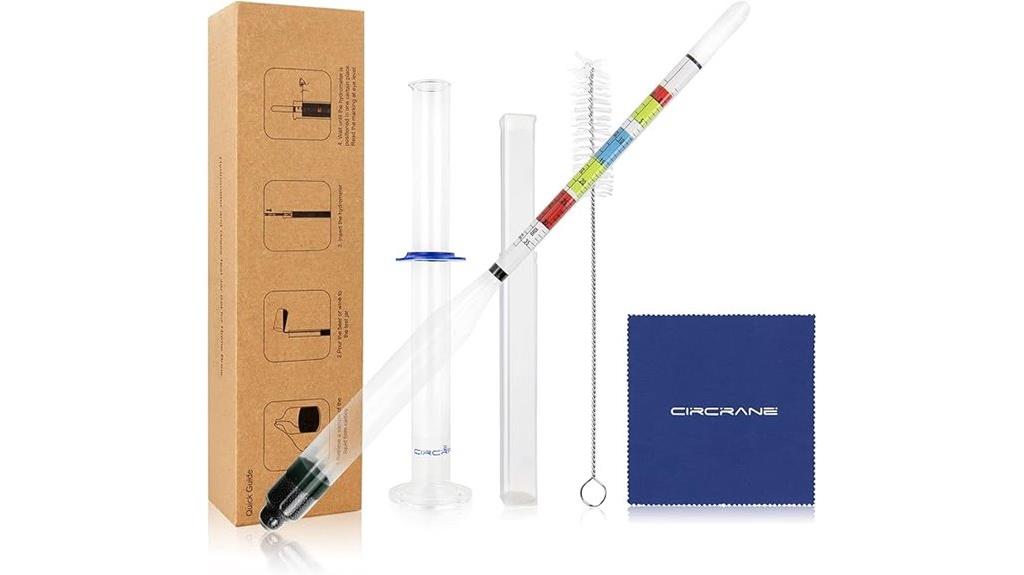
For home brewers looking to enhance their brewing process, the Circrane Hydrometer & Glass Test Jar Set stands out with its user-friendly design that minimizes measurement errors. This all-encompassing kit includes a triple scale alcohol hydrometer, allowing you to measure specific gravity, brix/balling, and potential alcohol content efficiently. You only need 125ml of liquid for testing, which reduces waste. The extra narrow measuring cylinder adds accuracy. With a customer rating of 4.5 stars and a one-year warranty, it’s highly regarded for its value. Plus, the protective case guarantees safe storage, helping you brew with confidence every time.
Best For: Home brewers looking for an accurate, efficient, and eco-friendly solution for measuring the alcohol content of their beverages.
Pros:
- User-friendly design minimizes measurement errors, making it suitable for both beginners and experienced brewers.
- Requires only 125ml of liquid for testing, reducing waste compared to traditional hydrometers.
- Includes a protective case which ensures safe storage and prevents breakage.
Cons:
- Some users have noted the fragility of the glass components, which may lead to breakage if not handled carefully.
- The kit may not be suitable for those who require larger volume testing as it only accommodates small samples.
- Limited to measuring alcohol content and specific gravity, which may not meet the needs of all specialized brewing processes.
Factors to Consider When Choosing a Beer Hydrometer
When you’re choosing a beer hydrometer, several important factors come into play. You’ll want to think about measurement accuracy, the types of scales available, and the quality of materials used. Additionally, consider the size, weight, and any included accessories that can enhance your brewing experience.
Measurement Accuracy Importance
Accurate measurements play an essential role in home brewing, as they help you monitor fermentation progress and calculate the final alcohol content. Measuring specific gravity, potential alcohol, and brix is key to achieving desired brewing outcomes. To guarantee reliable readings, choose a hydrometer that’s N.I.S.T. traceable. This assurance helps maintain consistency between different testing environments. Look for hydrometers with clear graduation markings, as they minimize user error and enhance precision. Additionally, select lead-free and mercury-free materials for both accuracy and safety. Regular calibration or testing against known standards is also important, allowing you to maintain measurement accuracy over time. By focusing on these factors, you’ll increase your odds of crafting exceptional homemade beer with confidence.
Scale Types Comparison
Choosing the right scale type is vital in ensuring your brewing process is effective and yields the desired results. Hydrometers usually come with a triple scale, which measures specific gravity, Brix/Balling, and potential alcohol. The specific gravity scale, ranging from 0.990 to 1.160, helps you determine the fermentation stage of your brew. The Brix scale measures sugar content on a 0-35 scale, important for evaluating sweetness. Finally, potential alcohol by volume (ABV) is usually indicated as a percentage, typically ranging from 0% to 21%. It’s imperative to select a hydrometer with clear and easy-to-read markings, as this can greatly enhance accuracy and reduce measurement errors, improving your brewing outcomes overall.
Material Quality Considerations
Selecting a beer hydrometer requires careful consideration of material quality, as it directly impacts both safety and performance. Look for hydrometers made from lead-free and mercury-free materials, ensuring safety for you and the environment. Glass hydrometers are common but can be fragile, so handle them with care. Consider models with stainless steel balls, as these enhance stability and measurement accuracy. Quality manufacturing processes by experienced glassblowers can greatly improve reading reliability. Additionally, environmentally friendly materials and designs show a commitment to sustainability, which matters to many consumers today. By focusing on these material quality factors, you’ll choose a hydrometer that not only performs well but also aligns with your values.
Size and Weight Factors
When considering a beer hydrometer, both size and weight play essential roles in its usability and performance. Compact models, measuring about 0.9 inches wide and 0.8 inches high, are easy to store and handle. A lighter hydrometer, weighing as little as 2.46 ounces, can make maneuvering in a test container simpler, helping you avoid spills and breakage. The size also affects the amount of liquid needed for accurate measurements; some hydrometers require only 125ml, reducing waste compared to the traditional 250ml. Choosing a compact design enhances measurement efficiency, allowing for more precise readings with less liquid. Overall, considering these factors guarantees you select a hydrometer that fits seamlessly into your brewing process.
Included Accessories Value
An assortment of included accessories can greatly enhance your experience with a beer hydrometer. Many hydrometers come with protective storage cases and microfiber cleaning cloths, ensuring proper care and maintenance. Some products also offer instructional materials or digital resources, which provide valuable insights for novice brewers. A test jar or measuring cylinder can improve measurement efficiency and accuracy, often needing less liquid than standard options. In certain kits, you might find a stainless steel bottle brush to help with cleaning, prolonging your equipment’s lifespan. Additionally, warranty and support options, like free replacements for broken accessories, can add significant value and peace of mind. Consider these factors to optimize your home brewing process.
Environmental Impact Awareness
Considering the environmental impact of your choices can greatly affect the sustainability of your home brewing practices. When selecting a beer hydrometer, opt for ones made from non-toxic materials that avoid mercury and lead, reducing health risks and toxic waste. Look for products crafted by local artisans to support local economies and minimize carbon footprints from shipping. Many manufacturers now use recycled materials for packaging, which helps reduce waste in production processes. Choosing hydrometers that are N.I.S.T. traceable not only guarantees measurement accuracy but also encourages environmental accountability. By avoiding single-use plastics and selecting eco-friendly options, you can considerably contribute to reducing pollution and promoting sustainable brewing practices in your home.
Ease of Use
Selecting the right beer hydrometer is not just about measuring specific gravity; it’s also about how easily you can use it during the brewing process. Look for hydrometers with easy-to-read scales and clear markings to minimize misreadings. Models that feature user-friendly designs, such as special fonts or color codes, enhance reading accuracy and reduce errors. Additionally, consider those that come with detailed instructions and educational resources, which can be especially helpful for beginners. Assess the size and shape too; a more compact design makes handling easier in narrower test containers. Finally, guarantee the hydrometer is made from durable materials to lessen the risk of breakage, making your brewing experience smoother and more enjoyable.
Frequently Asked Questions
How Do I Clean My Beer Hydrometer After Use?
To clean your beer hydrometer after use, rinse it gently with warm water to remove any residue. Avoid using harsh chemicals or scrubbing too hard, as this can damage the glass. If necessary, use a mild soap solution and a soft cloth for stubborn spots. Rinse thoroughly to guarantee no soap remains. Allow it to air dry completely before storing. Regular care will help maintain its accuracy and prolong its lifespan.
Can I Use a Hydrometer for Other Beverages?
Yes, you can use a hydrometer for other beverages, like wine, mead, or cider. Just as a compass guides you through uncharted waters, a hydrometer helps you measure specific gravity and sugar content in various liquids. To guarantee accuracy, make sure to clean the hydrometer properly between beverages. By doing so, you can successfully track fermentation and alcohol levels, providing essential insights for your brewing adventures beyond just beer.
What Temperature Should I Test My Beer At?
You should test your beer at the temperature specified on your hydrometer, usually around 60°F (15.6°C) for most measurements. Beer fermentation can slightly vary in temperature, so it’s best to allow it to reach the ideal temperature before taking a reading. Doing this guarantees your readings are more accurate. If your beer’s too cold or too warm, you might get misleading results, affecting your brewing process.
How Often Should I Calibrate My Hydrometer?
You should calibrate your hydrometer before each brewing session to guarantee accuracy. This is especially important if you’re using it frequently or if temperature fluctuations might affect its readings. Every few months, it’s wise to check its calibration against a trusted reference, like distilled water at 60°F, to verify its accuracy hasn’t shifted. Consistent calibration helps maintain reliable measurements, assuring your brewing process yields the best possible results.
Are There Digital Alternatives to Traditional Hydrometers?
Yes, there are digital alternatives to traditional hydrometers. For instance, many homebrewers now use digital refractometers, which measure the light refracted through the liquid. This provides quick and accurate readings of the specific gravity. Unlike traditional hydrometers, digital refractometers require less fluid for testing, making them convenient. They also often feature automatic temperature compensation, allowing you to get reliable results without recalibrating for temperature variations, thereby enhancing your brewing precision.
